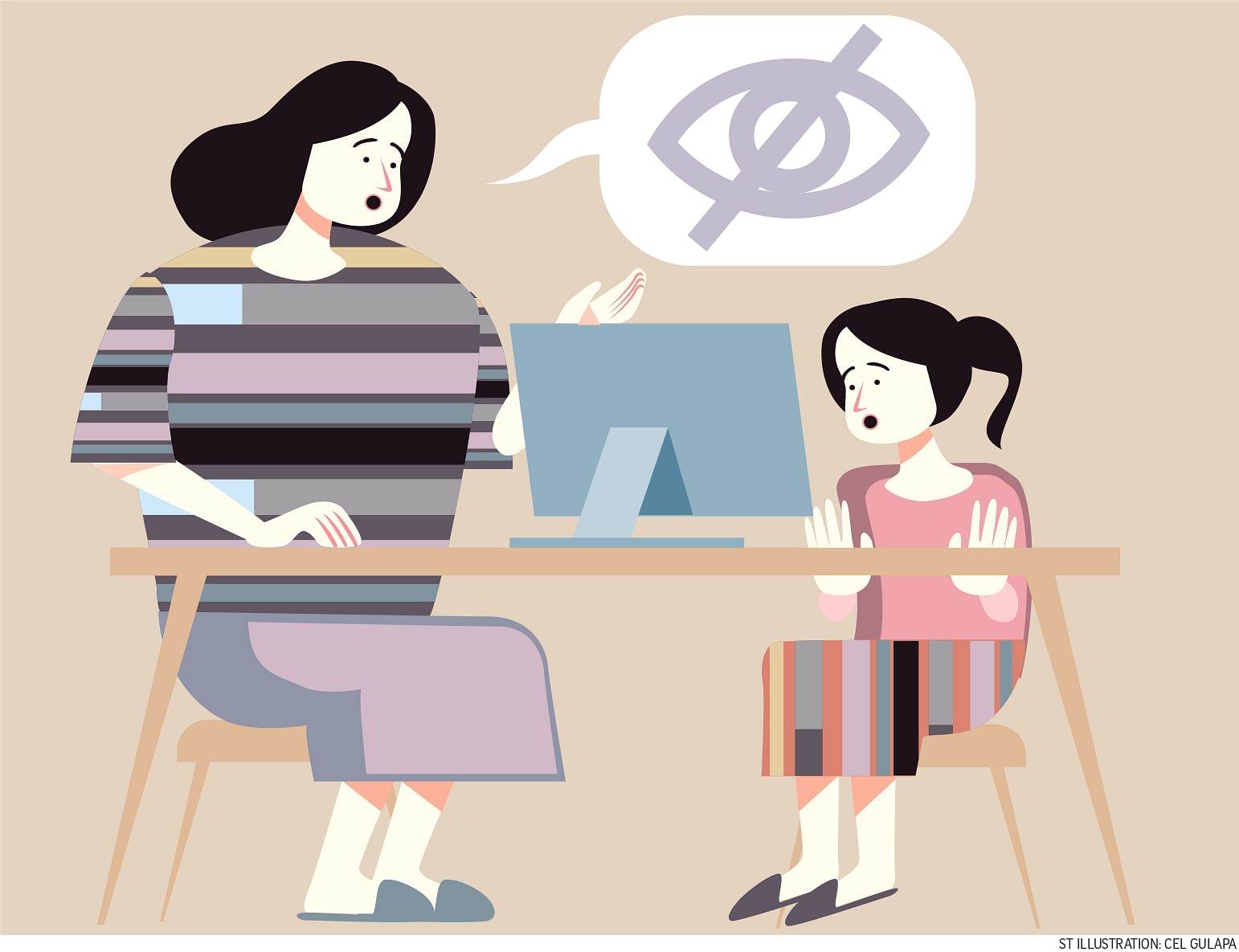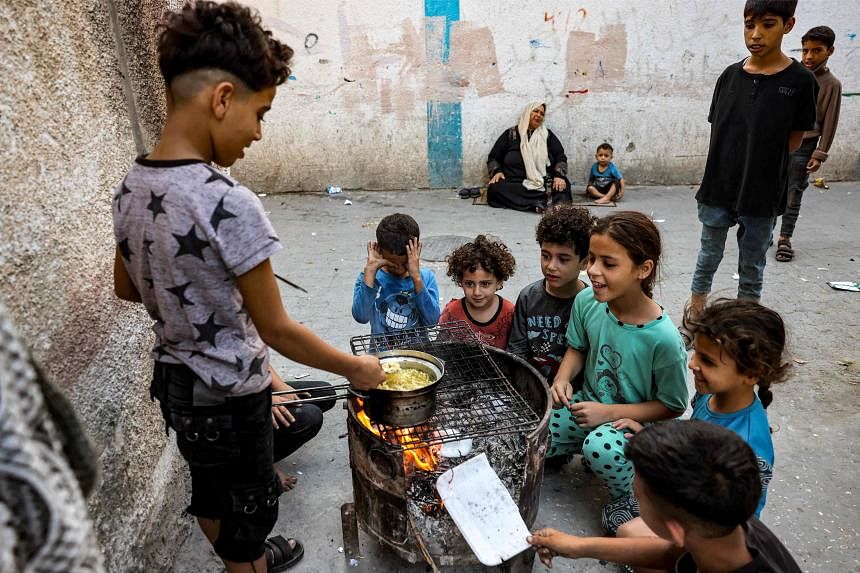SINGAPORE – Conflicts, like the latest fighting in the Middle East and Ukraine, as well as other sensitive topics such as the recent mass shooting in Prague have dominated the news.
Some involve political or religious issues, and information – both real and fake – is propagated widely over the Internet.
As a result, kids, tweens and teens may stumble across images, videos or stories of these conflicts whether through the platforms they frequent – such as Reddit, Instagram and TikTok – or hear about them from their friends and contacts.
Dealing with violence, religious conflict and fake news
Violence is often the most gruesome and obvious issue. In Gaza, at least 25,000 people have died as at Jan 21, according to its Ministry of Health. Violent images, including those involving children, are often unavoidable on the news and social media.
In Prague, a shooter who was identified as a postgraduate student gunned down 15 people in a university and opened fire from a rooftop, injuring passers-by. Images and videos of the incident in the Czech Republic, or of other shootings in schools and malls elsewhere, have been shared on social media and children may have come across them.
Religion is another topic which parents may want to tackle in conversations. For instance, in the Middle East, opinions have been influenced by religious lines, in no small part due to issues such as the anti-Semitic viewpoints of the Hamas charter or the use of religious imagery by Israeli leaders to justify its actions.
A third issue is the flood of fake information – whether deliberate or not – some of which may come from official sources. For instance, around the time of the October 2023 shooting at Siam Paragon in Bangkok, Thailand, one viral video that first appeared on Douyin claiming to be footage of the shooting was actually from an emergency drill shot months before in a Thai airport.
As big users of social media and the Internet, kids are likely to come across and be influenced by fake information.
While some fake stories may seem harmless or funny at first, other doctored information may warp people’s sense of the world or situations, change their value systems or create problems such as anxiety, psychological distress or endanger their physical safety.
Hard to avoid the headlines
Parents may have reservations about starting a conversation with their child about a sensitive issue such as war.
Dr Rebecca Chan, from the National Institute of Education, Nanyang Technological University, says parents may not know whether a child is cognitively or socio-emotionally mature enough, or do not want to burden their children with social anxiety, among other things.
The lecturer from the psychology and child and human development academic group adds: “Adults need to ask themselves, ‘What’s the purpose of bringing these topics to my children’s attention?’”
If a child has difficulty processing fragments of information picked up from listening to adult conversations, conversations with classmates, or social media and news reports, “then it would be appropriate to have a conversation with the child... rather than protect or limit their exposure”, she says.
This would help them process their thoughts, feelings, questions, anxiety or fear.
While some experts say it may not be ideal to discuss these topics if the children are too young, others say it is very likely they would have heard about it, and parents need to address that.
Mr Chong Ee Jay, a family life specialist from charity organisation Focus on the Family Singapore, says while parents may not have broached a sensitive subject like the ongoing war in Gaza with their children, their kids may have heard about it from their friends, even as early as in the pre-school years.
“If you know they are hearing about it or exposed to it in the media, such as if the television is on, you can use it as a segue into what is happening in the world right now,” says Mr Chong, who has been counselling and advising youth and families for 16 years.
It is not only about delivering the facts, but also a way to talk about the values of your family, he adds.

Let children lead the conversation
Experts say it is important to let the child or teenager lead the conversation.
This means allowing the young person to voice his or her points of view first. The adult can also ask questions, such as “What else have your friends said?” or “How much do you know about that?”
Mr Chong says: “A lot of youth tell me that their parents will come up with a lot of concerns and say, ‘Don’t do this, don’t do that.’ Immediately, when that happens, the child shuts down.”
The key is to have a dialogue, “not to convert them to your point of view, but to understand them better”, he advises.
Dr Chan says: “Don’t dismiss their worries or concerns. Do not turn the conversation into who is right or wrong, or ‘I know more than you.’”
Instead, focus on peaceful resolutions. For instance, parents could talk about how humanitarian aid, such as communities offering refugees shelter, or countries raising funds or sending blankets and food to affected communities.
Or, in the case of the war in Ukraine, parents can discuss possible outcomes for the conflict to end without further bloodshed.
Such a conversation is also a good way to gain some insights into how your child thinks and processes information, she added.
When it comes to talking about religion, Mr Ahmad Firdaus Daud, a spokesman and volunteer with community organisation Roses of Peace, suggests starting a conversation from “a position of humility and respect”.
“We can broach many difficult conversations with the right etiquette. People can disagree with one another respectfully and politely, without gaslighting or ad hominem attacks.”
Choose words carefully
You may be caught off guard if your child asks you about a sensitive topic and you have not yet had the chance to form an opinion.
In that case, it is okay to deflect the conversation, “but you can’t deflect it forever”, Mr Chong says.
“Don’t sweep it under the carpet. Say, ‘Let mum and dad have some thought about it and we will come back to you tomorrow,’” he adds.
Then ensure you take the time to do your own reading and research.
Mr Chong says: “Take the time to think about where you stand on the issue and, more importantly, the reason for it.”
Dr Chan also notes the importance of avoiding words that would stereotype people based on their religion, gender, colour, race or nationality. For instance, do not say, “All terrorists are (a particular nationality or race)”.
“Instead, use words that promote equity and respect, and words that promote perspective-taking, empathy and peace,” she adds.
Parents may ask their children, “If you were in their shoes, what would you do?” or “How do you think your friend would feel?”
Mr Firdaus adds that misconceptions about religions “arise from ignorance or having a limited or skewed understanding”.
If a child has a misconception of a particular religion, he advises encouraging them to study its history, make friends with those from that religion, and join inter-faith activities and dialogues. They can also read up on the beliefs of that religion, should they wish, and the adult should lead by example.
When it comes to fake news, similarly, pick your words carefully, so your tone does not convey an “I’m right, you’re wrong” message. This may shut down conversations and opportunities for discussion.
Instead, ask for more information, such as where they saw the news, what made them believe it was true, or how they felt after seeing this information.
This may give the parent more intel about the sites they are visiting or the beliefs they are building. The adult can then guide the child to, say, tell the difference between a satirical website and a factual source, or to tell if someone is stating an opinion, a prediction or a fact.
Create trust and strengthen family ties
Ultimately, being able to have conversations, especially about difficult topics, creates trust and develops the ability to tackle problems, which is essential to strengthening familial relationships.
Mr Firdaus says: “We need to have difficult conversations on religion and religious differences with our children and with one another, if we want to retain unity and social cohesion against extremist minorities.”
He adds that it is fine to “show a little bit of vulnerability and admit that even adults may not have answers”.
It gives parents a chance to talk about who their family is.
“We can then instead share the principles and values from which we can draw out answers to difficult questions, and the tools or skills we need to find the right information for difficult questions,” he says.
Mr Chong agrees, saying that when it comes to building a strong parent-child relationship, “you cannot run away from these kinds of long-haul conversations”.
How to talk to kids of any age about war and other headline news
Dr Rebecca Chan, a lecturer from the psychology and child and human development academic group of the National Institute of Education, shares tips on how to approach kids, based on their age.
Age four and younger: At this age, a child’s reasoning is more intuitive than logical. He may also have limited language communication skills, even as he develops an emerging sense of right and wrong.
Should a child at this age be exposed to images of wars or other kinds of violence, an adult can answer his questions honestly and in a developmentally age-appropriate way.
For instance, say “Yes, this is a picture of people in pain”, without going into too much detail.
Age five to seven: You can use simple language to have a conversation about violence with children in this age group. At this age, they are able to state what is good or bad behaviour, and right or wrong, among other things. Parents can explain how certain actions, such as forcing a dog to sit by shoving it or pushing someone away to snatch their toys, are considered as violence.
Age seven to 12: Primary school children show more awareness of rules and their purpose, as well as the consequences if rules are broken. They may be curious to seek out the underlying reasons of what actually triggered the war or conflict, for instance.
Adults need to be honest with them – say “I don’t know” if you really don’t know what’s going on – without giving more detail than necessary.
Age 12 to 15: Kids in this age group tend to question logic and choices, engage in thought experiments and are open to a variety of perspectives. They are able to negotiate and debate ideas as an outlet for expressing their ideas.
Adults can engage them in more sophisticated discussions, with the aim of helping them develop a sense of responsibility and their role in making their immediate community a better place to live in.
Adults can help them to see things from a more systemic perspective. For instance, they can explain that, while Ukraine is far away from Singapore, the war there can impact people here because of the global nature of trade in fuel and food.


